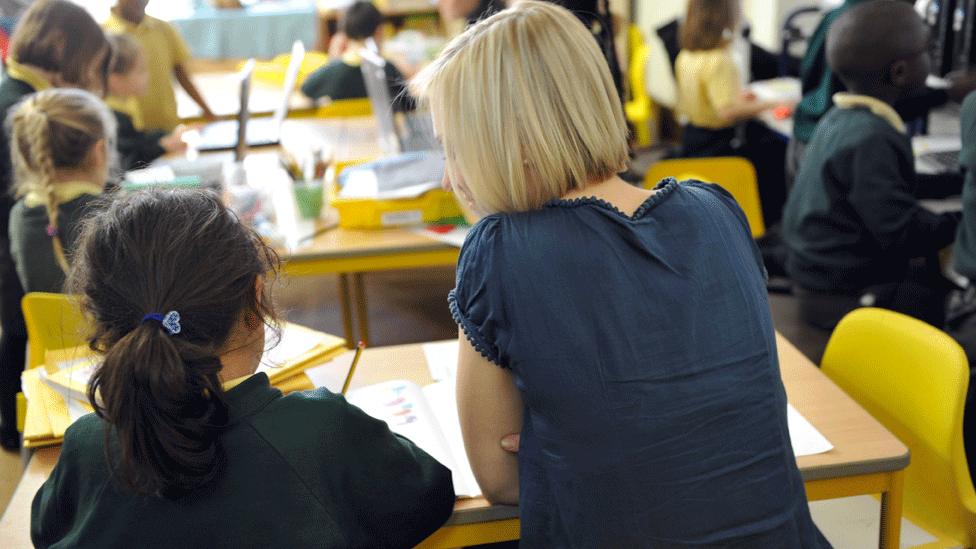Warning over STEM teacher recruitment
- Published
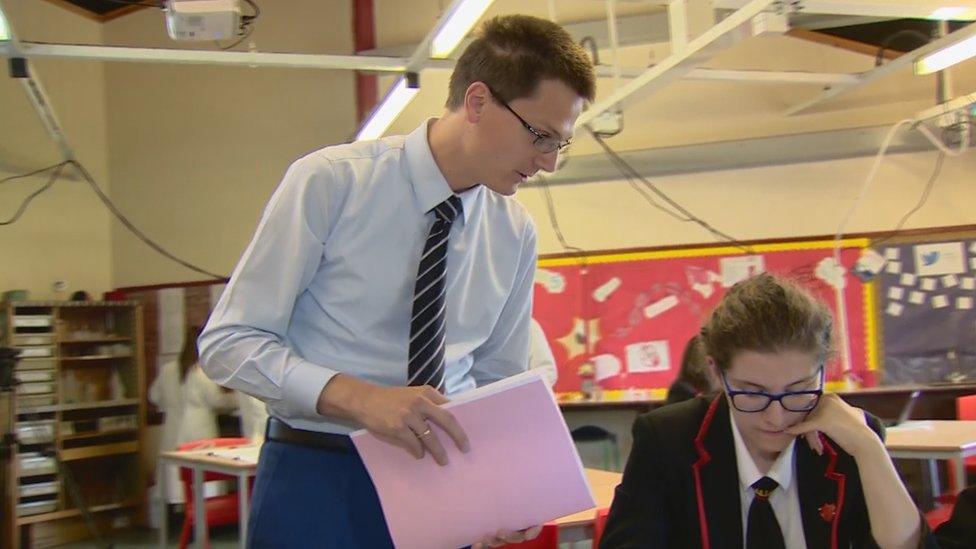
Science is one of the subject areas for which it is difficult to find suitable teachers
Several Scottish councils are warning they are finding it hard to recruit new science, technology and maths teachers.
A number have told BBC Scotland they have had fewer applications for teaching posts in these so-called STEM subjects than they had hoped for.
In some cases it has been impossible to fill posts and, as a result, courses or subjects have been dropped.
Scotland's largest teachers' union, the EIS, said any unfilled vacancy was a cause for concern.
Scotland's education secretary John Swinney told BBC Scotland: "There are quite clearly challenges in different parts of the country about recruitment of teachers and I want to make sure we have a strong teaching profession available in every school in the country."
He added: "There is a particular challenge in the STEM (Science, Technology, Engineering, Maths) subjects which is why I focused the recruitment campaign last year on exactly those subjects to encourage and motivate more individuals who perhaps have got a background in STEM activities in other areas of the work environment to make the choice of coming into teaching."
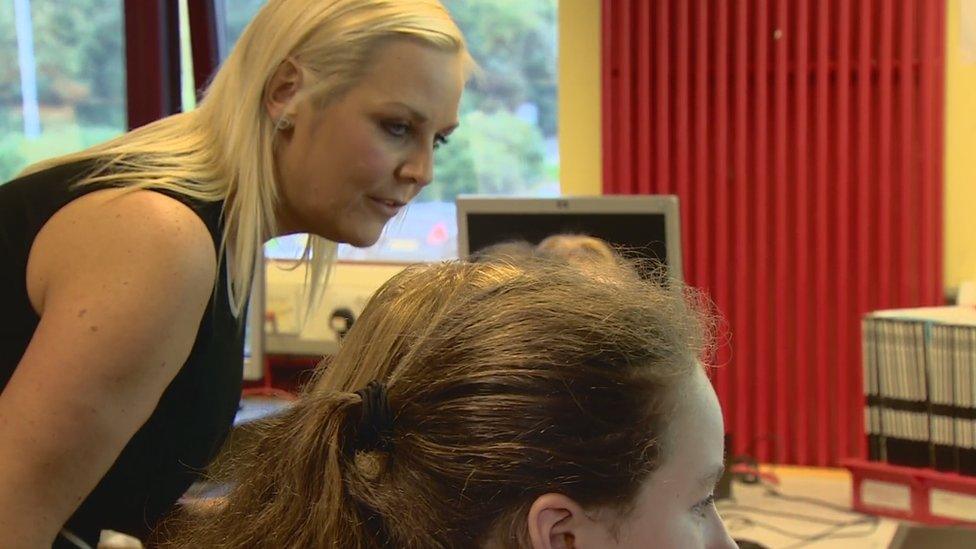
Official statistics from December last year said there were 48,746 teachers in Scottish schools.
BBC Scotland asked all 32 councils across Scotland how many vacancies for teachers they had when the new school term began two weeks ago.
Nationally the total - which includes primary teachers, secondary teachers and heads - came to more than 680.
Almost half were for secondary school teachers.
While some councils had relatively few vacancies and did not believe they had an overall problem, others had experienced some difficulties finding applicants.
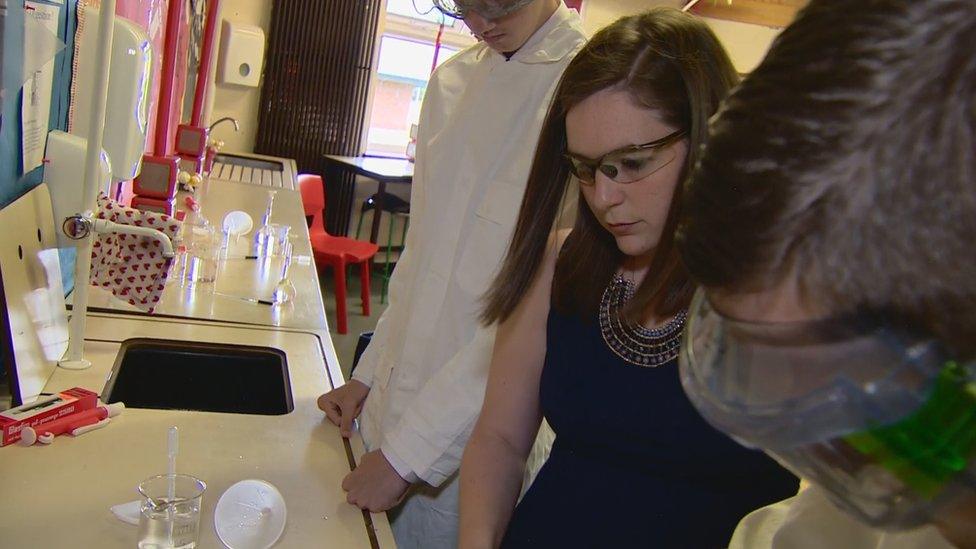
Many councils stressed that they did not regard teacher recruitment as a problem overall and were confident most current vacancies would be filled quickly.
But several, including Fife, North Lanarkshire and Moray, highlighted difficulties they have had attracting applicants in science, maths and technology. Some also pinpointed home economics as a challenge.
Meanwhile, the Scottish government is launching the latest phase of its campaign to encourage more people to train as teachers. Students of home economics are among those now being specifically targeted.
Launching the new phase of the Teaching Makes People , externalcampaign, Mr Swinney said: ""There are quite clearly a range of career choices available to individuals who are involved in STEM activities and we have to encourage more of them to make teaching a priority."
The councils who have noted difficulties in specific subject areas include:
Scottish Borders, who highlighted the challenges they had faced filling vacancies in Maths, Business Studies, Home Economics, Physics, Computing and technical subjects.
Fife noted that what it called a "national shortage" was particularly acute in English, Maths, Home Economics, Business Education and Computing.
Highland said it was difficult to recruit to all the STEM subjects especially Maths

READ MORE ON THIS:

National 5 course dropped because of vacancy
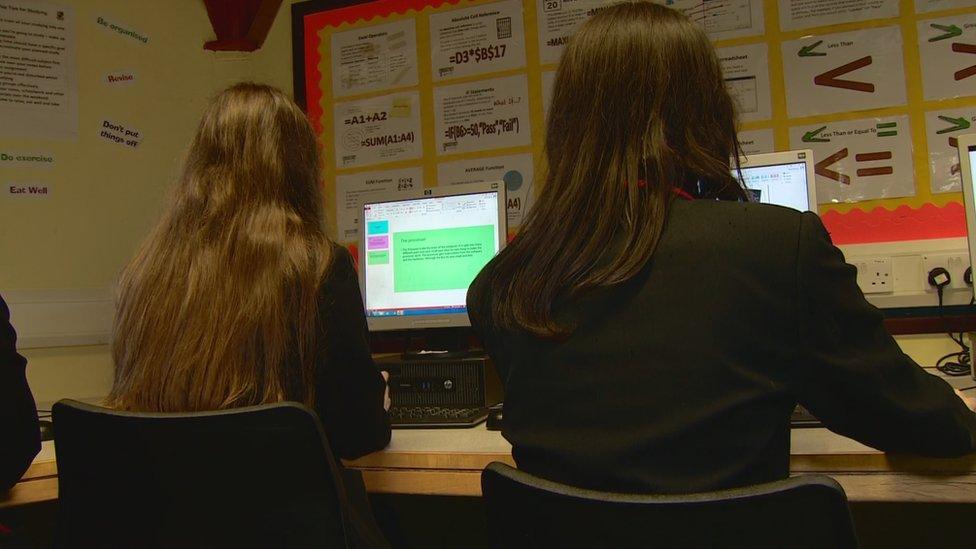
Usually when a vacancy cannot easily be filled, temporary solutions are found - for instance using supply teachers.
But occasionally the difficulty filling a vacancy can have a direct impact on students.
Lochgelly High School in Fife has been trying to recruit a new computing teacher since June - the person who held the post before moved to another school in Fife much closer to their home.
Because a new teacher has still not been appointed, there is no National 5 class in computing science this year.
Those studying for a Higher or Advanced Higher are having to stay behind after 4pm so they can be taught by a teacher from another school, who is being paid overtime.
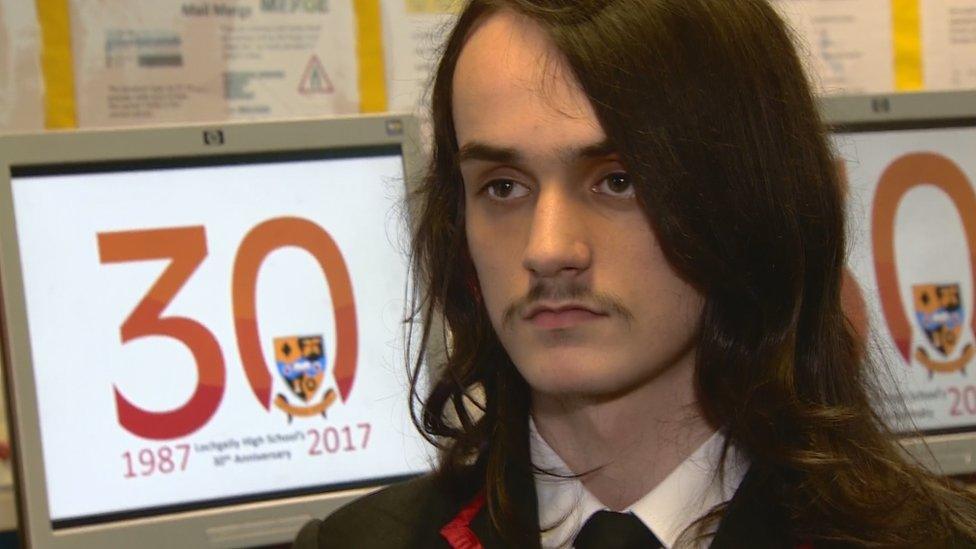
Shaun Young is studying for an Advanced Higher in Computer Science
S6 student Shaun Young is studying for an Advanced Higher in Computing Science. He hopes to put his love of the subject to good use by studying games development at Abertay University before he gets a job in the industry.
Because there is no computing science teacher at the school, Shaun stays back until 6pm twice a week. A teacher from another school in Fife is travelling to Lochgelly at the end of their day to teach Higher and Advanced Higher students.
Shaun stressed that he did not mind remaining back late but it was obviously not ideal.
Head teacher Carol Ann Penrose said the school first advertised for a new computing teacher in June but received no applicants. There are no other current vacancies at the school.
She said she was not a surprise that the school had found it hard to fill the post as this had been a problem in the subject before.
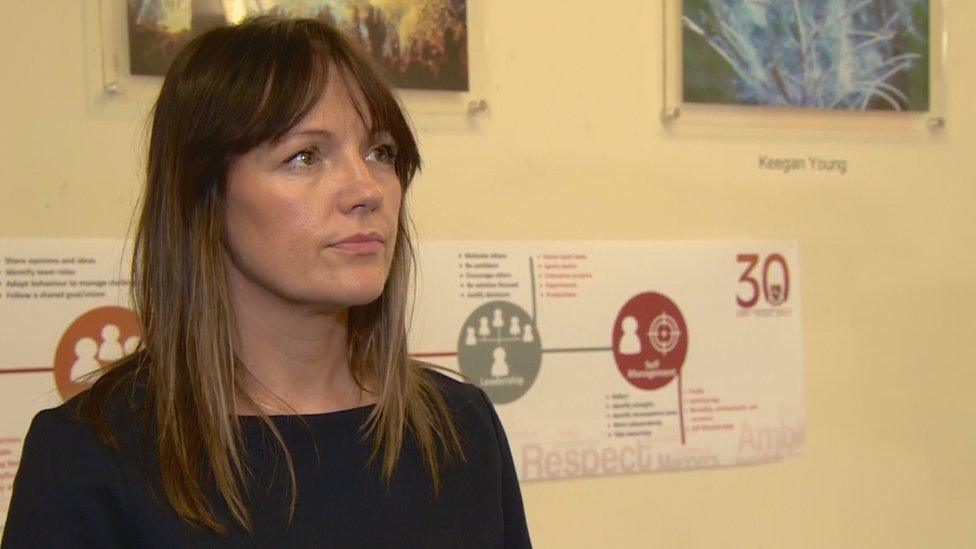
Head teacher Carol Ann Penrose still hopes to attract suitable applicants
Ms Penrose said she took steps to find a "creative solution" to help students once it was clear a new teacher would not be in post for the start of term.
The post is still being advertised and the head teacher hopes to attract suitable applicants. She describes Lochgelly as a "fantastic school" and believes teaching is an excellent, rewarding job.
She said some other schools in Fife had seen problems recruiting in STEM subjects but that the council had been proactive in trying to deal with them.
Education Secretary John Swinney said the situation at Lochgelly was "clearly unwelcome".
He said: "I would encourage local authorities to work in collaboration between schools to ensure that young people can secure the educational provision they require.
"We have got to encourage cooperation. There can't be enough cooperation.
"We have got to ensure that we focus on the interests of young people, on making sure they can fulfil their educational potential by gaining access to the courses in which they are interested."
Across Fife there were 17 vacancies for secondary school teachers at the start of term although most were not causing any immediate difficulties.

Teacher vacancies by council
BBC Scotland asked councils how many teaching posts were being advertised on 17 August.
The totals below include head teachers as well as primary and secondary teachers.
Aberdeen - No response
Aberdeenshire - 41
Angus - 21
Argyll and Bute - 24
Clackmannanshire - 6
Dumfries and Galloway - 4
Dundee City - 8
East Ayrshire Council - 41
East Dunbartonshire - 18
East Lothian- 27
East Renfrewshire - 19
Edinburgh - 44
Falkirk - 25
Fife - 23
Glasgow - 48
Highland - 63
Inverclyde - 9
Midlothian - 6
Moray - 34
North Ayrshire - 11
North Lanarkshire - 65
Orkney - 12
Perth and Kinross - No response
Renfrewshire Council - 9
South Ayrshire - 25
Scottish Borders - 24
Shetland - 11
South Lanarkshire - 20
Stirling - 14
West Dunbartonshire - 7
West Lothian - 28
Western Isles - No response
Total number of vacancies including primaries, secondaries and heads - 687
Total number of secondary vacancies - 336.

Difficulties in STEM subjects
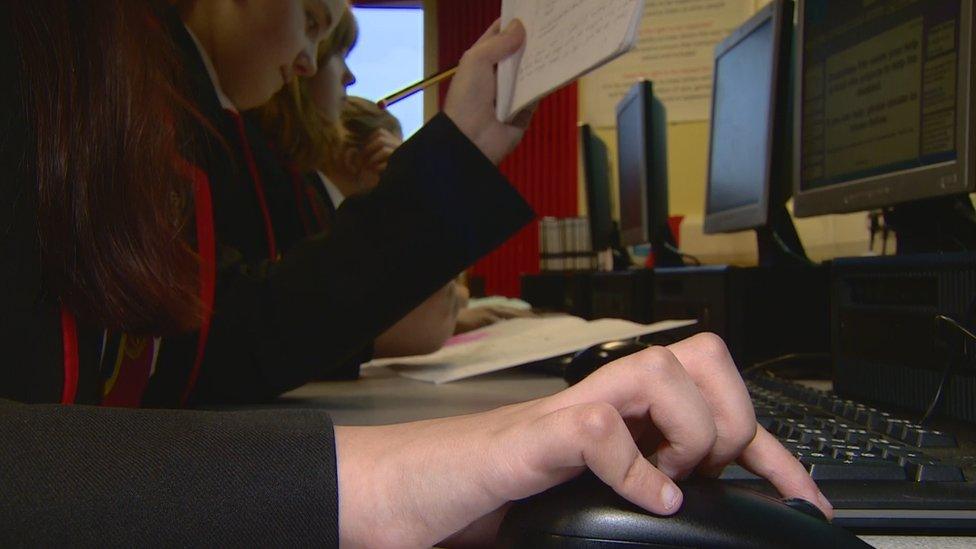
Lochgelly hopes a new teacher will be appointed in the next few weeks.
But the problems experienced by Lochgelly provide a stark example of the challenge a number of councils have faced filling vacancies in STEM subjects.
Other councils which said they have experienced some difficulties recruiting in STEM (Science, Technology, Engineering and Mathematics) subjects or a lack of applicants included Highland, Moray, West Dumbarton, Falkirk, North Ayrshire, North Lanarkshire South Ayrshire, East Lothian, Orkney and Falkirk.
Moray Council - which like some other rural councils has faced wider teacher recruitment problems in recent years - said: "In the past three years teachers and principal teachers of technical subjects have been the most challenging to fill in our area.
"This means the subject choice has had to be reduced in certain schools as a result."
North Ayrshire only had four secondary vacancies at the start of term but said: "We have found that the number of teachers applying for vacancies in Maths, English and Physics can sometimes be low. Vacancies in Home Economics are often difficult to fill."

New ways of becoming a teacher
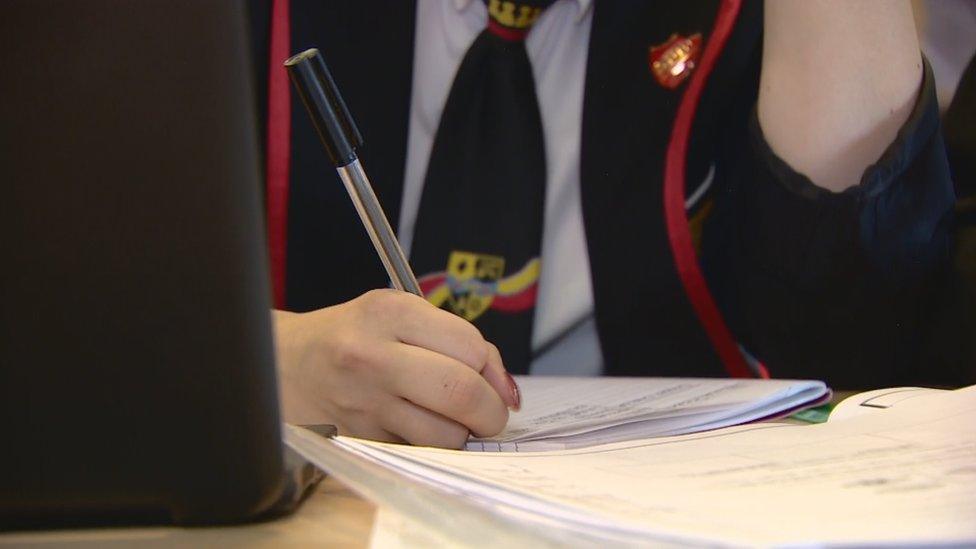
One underlying challenge is persuading more science and technology students to consider becoming teachers.
A new teacher-training course at Strathclyde University cuts the time it takes for some new teachers to qualify - in effect combining traditional teacher-training and a student's probationary year.
Another scheme in the North East aims to help people who previously worked in the offshore oil and gas industry to retrain as teachers.
All teacher-training programmes in Scotland have to be approved by the General Teaching Council for Scotland - an independent professional body which includes representatives from the unions and the profession itself as well as other stakeholders.
The Scottish government is expected to issue a tender document in the coming weeks for a new course to help widen the ways into teaching.
While the EIS union is happy to consider ways of widening the pathways into teaching, it believes the traditional method of becoming a secondary teacher - a one-year postgraduate course followed by a probationary year in a school - should still be the main method.
It would strongly oppose any attempt to introduce courses which would see new trainees placed in the classroom at an early stage.
The charity Teach First, which runs such a scheme south of the border, has held talks in Scotland about this possibility.
Generally the unions believe recruitment problems do not provide a pretext for radical changes to teacher-training.
They claim the solutions involve persuading more science or technology graduates to become teachers and making sure the profession is sufficiently attractive.
EIS general secretary Larry Flanagan added: "With schools having only recently returned for the new term, unfilled vacancies are obviously a cause for concern.
"The challenge in recruiting teachers in certain subjects and geographical areas should be taken as an early warning of what might develop if action is not taken to make teaching a more attractive career option, including a significant improvement in teachers' pay and conditions and reduction in excessive teacher workload."
Grow your own teacher
Other initiatives include "grow your own" schemes to train people to become teachers within their local area.
Aberdeenshire Council's director of education and children's services, Maria Walker, said such schemes had allowed people who already live in Aberdeenshire and who want to stay in the area to become teachers.
She said: "The downturn in the oil and gas industry has hit the North East of Scotland hard and there are lots of very experienced and technically skilled people looking for a new job or a new career.
"A number of candidates recently completed a programme specifically designed to help them make the transition from the oil and gas industry to teaching and are now on the verge of starting their probation year."
- Published15 August 2017
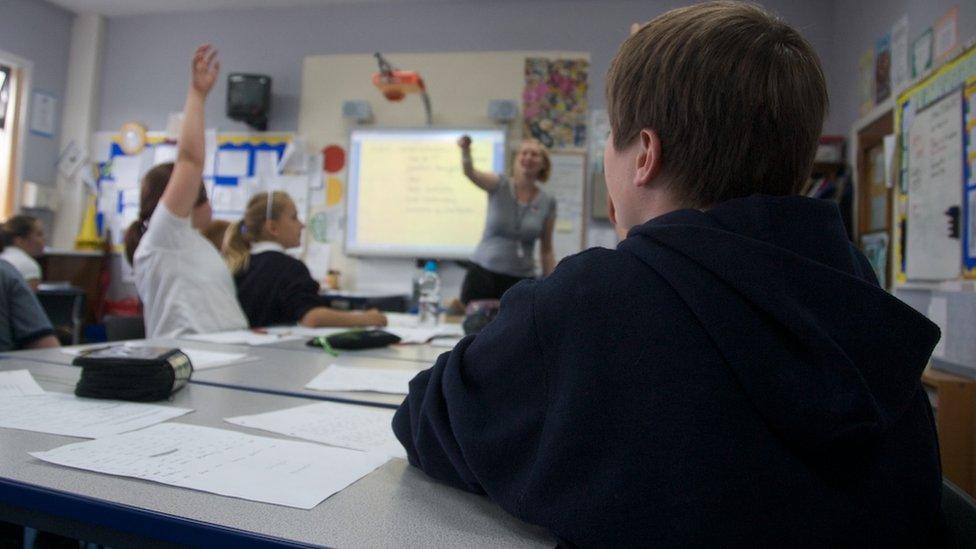
- Published10 June 2017
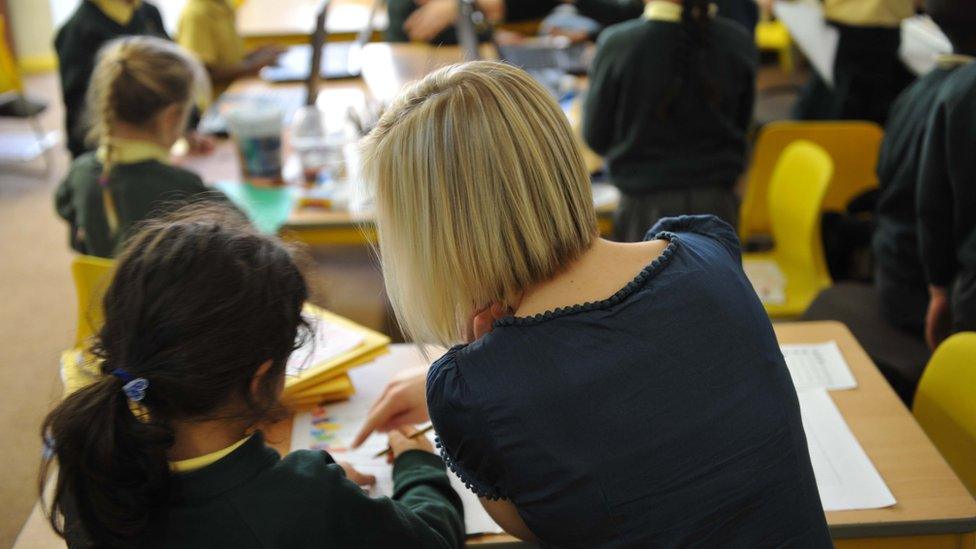
- Published30 November 2016
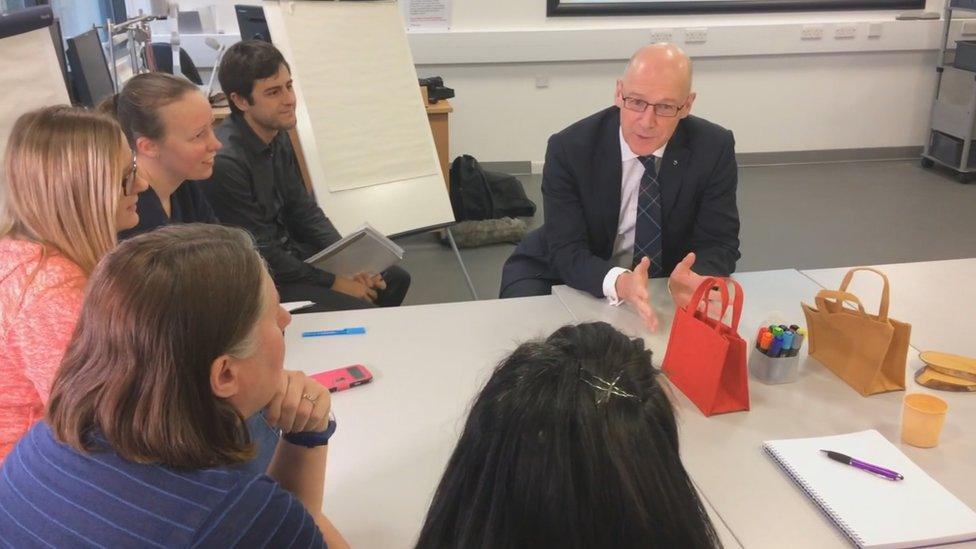
- Published30 November 2016
